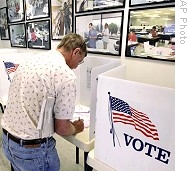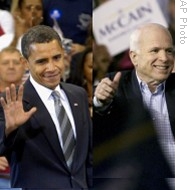VOA标准英语10月-Analysts Say Swing States Hold Key to US Election
搜索关注在线英语听力室公众号:tingroom,领取免费英语资料大礼包。
(单词翻译)
In the final days of the U.S. presidential election campaign, candidates Barack Obama and John McCain will focus on a relatively1 small handful of states that will provide the margin2 of victory on Election Day, November 4. VOA National Correspondent Jim Malone reports from Washington. |
| Man votes early in Norwalk, California 06 Oct 2008 |
In the 2000 election, Democrat3 Al Gore4 won more popular votes than his Republican opponent, then Texas governor George Bush. But Mr. Bush won the election because he defeated Gore in the electoral vote tally5.
Each state has a certain number of electoral votes based on the number of Senate and House members who represent that state in Congress. Each state has two senators, but the number of House seats for a given state depends on population.
California, the largest state, has 53 House members and two senators, for a total of 55 electoral votes. Wyoming, one of the smallest states, has only three electoral votes, taking into account its two U.S. senators and one House member.
 |
| US presidential candidates Barack Obama in Fayetteville, N.C. and John McCain in Toledo, Ohio, 19 Oct 2008 |
As they campaign in the final days, both Barack Obama and John McCain will try to cobble together enough electoral votes to get to the magic number of 270 to clinch6 the presidency7.
American University expert Curtis Gans says each candidate looks at the electoral map of the country differently.
"Every candidate in this polarized country at this point starts with a number of states that are clearly their states to win, and a number of states that are their states to lose," Gans said.
As in most presidential elections, the candidates wind up focusing on a relatively small handful of so-called swing or battleground states, states where the race is close and states that have enough electoral votes to make a difference in the outcome of the election.
Larry Sabato directs the Center for Politics at the University of Virginia.
"Out of the 50 states, about 40 of them are almost predetermined, and we can call them today. So, the focus is on ten competitive states, relatively competitive," Sabato explained. "Some of them are complete toss-ups, could go in either direction. I think Ohio and Virginia are in that category. Others may be leaning one way or another. So, we tend to focus on these states because they are the ones in the end who determine who is going to be president."
For example, Republican presidential candidates tend to do well in the deep South and the Plains states. Democrats8 do well in the Northeast, along the Pacific coast and in the upper Midwest.
That leaves 10 to 12 swing states where both campaigns are competitive, states that will provide the margin of victory on November 4.
Dennis Johnson is a political expert at George Washington University.
"When you think about the strategy of an election, the most important number is 270. And that is the number of electors that will get you over the top (to win the presidency). And, any combination of states that has 270, that is the magic number that you are really looking for," Johnson said.
Recent polls give Democrat Barack Obama an edge in some of the larger swing or battleground states, states like Pennsylvania, Ohio, Michigan and Indiana.
Obama has been leading even in Florida, the state that gave President Bush his narrow victory over Al Gore in 2000.
Obama is also doing well in states like Nevada, Colorado and even North Carolina, all of which have tended to vote Republican in recent years.
Tom DeFrank is Washington bureau chief of the New York Daily News and a longtime observer of U.S. politics.
"These are states that are usually Republican, for the most part, and states that McCain has to win," DeFrank said. "And so, Obama has an easier path. He has got a better electoral map and he has got momentum9 on his side and it would take a string of things to go McCain's way for this trend to be reversed. It could happen but it's not likely at the moment."
National polls are important in the closing days of the presidential race. But experts will be keeping a close eye on the race in several individual key states on election night, as they watch to see which of the two candidates will get to the magic number of 270 electoral votes first.




